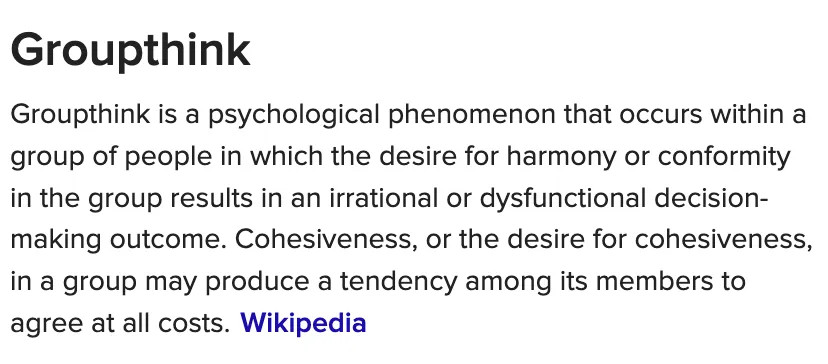By Robert W Malone MD, MS
Who is Robert Malone
August 17, 2022
Those who routinely read these substack essays and our social media posts know that Jill and I have been on a journey of discovery, a root cause analysis approach, trying to make sense of the horrid public policy decision making that has resulted in the COVIDcrisis. Key milestones along the way have included recognizing the role of the trusted news initiative (see here and here), the rise and global penetration of advocacy journalism, developing a deeper understanding of the role of the World Economic Forum/Great Reset and its young leader training/indoctrination program, the process of Mass formation or Mass Psychosis (the psychological basis of totalitarianism), widespread regulatory and other forms of government capture, the role of the administrative state, exploitation of the "crisis" by central banks and massive investment funds, the weaponization of infectious disease fearporn as both a media business model and a political tool, "Nudge" technology and governmental behavior control, and so many other factors that have contributed to the emergent global "COVIDcrisis" phenomenon that has destroyed millions of lives, businesses, children's education, faith in the integrity of science and medicine, and triggered an economic crisis that threatens to bring down the pillars which support western economies and banking systems. The tendency of many is to focus on one of these as the root cause, and to overlook the complex global interplay of all factors, a very human bias to seek a single factor or individual that should be held accountable. Favorites are often the WEF/Klaus Schwab (who somehow created himself as a caricature of evil), Bill Gates (likewise), Larry Fink/Blackrock as well as the Vanguard and State Street investment funds, the small number banking families that control most of the central banks, the United Nations, the World Health Organization/ Veterinarian Dr. Tedros, the rise of the Administrative-corporate state/ inverted totalitarianism, Anthony Fauci, Deborah Birx, the list goes on and on. All have played a role in fostering this global disaster which began with introduction of a new variant of an existing RNA respiratory virus into the global human population and seems to be winding down as one of the greatest global policy failures in human history.
Borrowing a term from Economics, most of these interacting factors are more macroscopic in scope. But what about the more microscopic phenomena. Are there systemwide or general organizational behaviors or processes that have contributed to the resulting clusterfrack? Have any of these types of effects contributed to the decision making? Are there widespread organizational practices that have enabled something like an emergent fractal process such as that described by Harrison Koehli in his recent essays which critically compare and contrast the work of both Mattias Desmet and Andrew Lobaczewski (see Political Ponerology: The Science of Evil, Psychopathy, and the Origins of Totalitarianism). Is there a component of this mess which is a consequence of how our governments and large businesses are organized, some seemingly benign fundamental organizational behaviors that could be clearly identified and therefore are amenable to being altered so that we could reduce the risk of future overreaction and collective global madness?
Many believe that the many tentacles of post-modern relativism and arrival at the logical endpoint of trends in modern liberal individualism provide one explanation, a cultural bias-based explanation for the COVIDcrisis. But to the extent that is true, it will require deep political "generational"-level changes to fix that problem.
What about some of the simple organizational assumptions which are widely taught and dearly held by corporations and governmental policy makers?
With this prelude, let's consider something that has been on my mind a lot lately. There is a style of group decision making that leads to poor group decisions, ergo: groupthink, that has come to dominate management practices in both government and large businesses. Why is that happening?
As some of you know from my last article on this subject, groupthink is something distinct from the idea of mass formation that Mattias Desmet has developed and expanded on. I wrote and have spoken about group think in the context of Deborah Birx, who was responsible for "Warp Speed" and what has happened with US HHS COVIDcrisis management.
Let's take a moment to examine the theories behind modern management practices in the context of the entire COVIDcrisis fecal-show that has resulted in the public policy responses of the US government as well as the global response by the World Health Organization (WHO) and other nations.
Groupthink has now permeated the administrative state, to such an extent that the methods used to combat groupthink have all but disappeared from the mindset of group managers.
So, just to recap, what is groupthink?
Groupthink was coined by author Irving Janis, first in an article in 1971 and then expanded on in his famous book "Victims of Groupthink". The focus of Janis's work was on small group dynamics or theory. Janus wrote about the behavior of small groups and how groups work in a positive way and also in a negative way.
As he was proceeding with his academic work, he realized that he was seeing examples of group behavior gone awry, gone bad, particularly in the context of various federal decisions that occurred during the '60s, and then up to his present.
Janis Analyzed the behaviors of small groups under pressure making key decisions. Janus also came up with some really clear guidance on how to combat groupthink. Through a series of case studies focused on US government successes and major policy failures, Janis described how closed insular self-reinforcing groups tend to behave and how they can go wrong.
Friedrich Nietzsche (1844-1900) alluded to the same phenomena by writing: "Madness is the exception in individuals, but the rule in groups." That statement informs Irving Janis' whole analysis and his personal theory which is captured in this small textbook.
